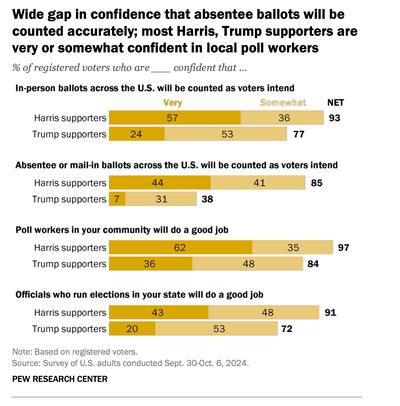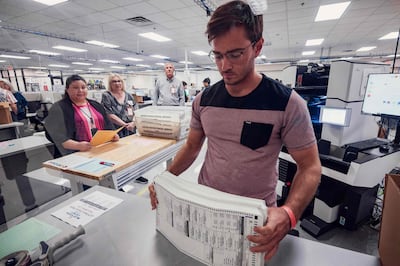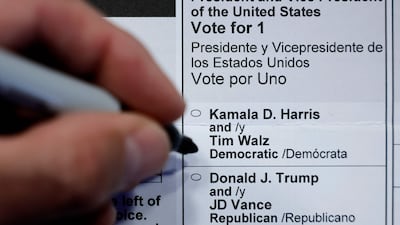Latest updates: Follow our full coverage on the US election
Former US president Donald Trump's unfounded insistence that his 2020 electoral defeat was the result of a rigged election lingers in the minds of his supporters days before the 2024 presidential election, in which he will square off against Kamala Harris.
A report from the Pew Research Centre shows that Harris supporters are more optimistic about the way the election will be run.
"Ninety per cent say they are at least somewhat confident that elections across the United States will be administered well. This compares with 57 per cent of Trump supporters who are confident the election will be run smoothly," the report from the non-partisan social science research and polling firm said.
The report also said that supporters of Democratic candidate Ms Harris are more confident than Trump supporters that mail-in ballots will be counted accurately, and that the US election system was secure from hacking and other technological threats.

In the lead-up to the 2016 election between Republican Mr Trump, at the time president, and Democratic challenger Joe Biden, Mr Trump repeatedly scoffed at the idea of mail-in votes and early voting, claiming without proof that the processes were ripe for fraud.
This particular stance during the 2016 campaign saw the Democratic Party take great strides in creating a sophisticated early voting effort, while many say the Republican Party fell behind.
That strategic blunder, in part, seems to have been corrected to some extent, with Mr Trump now occasionally encouraging his supporters to vote early where possible, although in many states it appears that Democrats still have an advantage for early and mail-in voting.
Pew's latest research shows that years of Mr Trump and his supporters crying voter fraud has created an uphill battle for Republicans hoping to erase Democratic leads in early voting.
"As was the case four years ago, Trump supporters are particularly sceptical that absentee and mail-in ballots will be counted as voters intend," read the report.
The analysis also noted that, compared to 2016, the scepticism and waning confidence in the election system from Trump supporters has grown.
Those planning on voting for Mr Trump, according to Pew, are significantly more confident in election integrity in states where the legislature is controlled by Republicans, while Harris supporters are "broadly confident" in election officials regardless of which party is in control of the state legislature.
There is one area in the poll, however, where Trump supporters seem to be more confident than Harris supporters, and that involves the Supreme Court.
According to the research, while most of those surveyed feel that the Supreme Court would not be able to remain politically neutral in handling a potential decision that could affect the results of the presidential election, 34 per cent of Trump supporters believe the nation's highest court would remain neutral, compared to only 6 per cent of those supporting Ms Harris.
That could stem from the 2000 election, when the Supreme Court decided to halt a vote recount in the hotly contested state of Florida, and ultimately led to the defeat of Democratic candidate Al Gore against his Republican challenger George W Bush.
In various legal and political circles, that five-to-four Supreme Court decision was seen as partisan.
With less than two weeks to go until this year's presidential election, the continuing tension and paranoia over elections seem to be nearing a crescendo.
Part of this is that each of the 50 US states has a slightly different approach as to how to process, count and audit votes.
Timothy Kneeland, a professor of history, politics and law at Nazareth University, said that the somewhat fragmented nature of the presidential election among the states has its origins in the founding of the US.

"Each state had its own sovereignty, and it gave up some of that to create this collective nation," he said, noting that the importance of state sovereignty can be seen in more areas than just elections.
"For example, if there's a hurricane barreling down on the state of Florida, the federal government can't go in and just, you know, commit assistance or anything, until the governor of that state formally, by letter, invites the federal government to request the federal government's assistance."
All that aside, unless the polls are drastically wrong, many feel there will not be a winner decided on election night, and that solidifying who the winner is could take several days.
"Just be patient," said Washington Mayor Muriel Bowser during a news conference in which she discussed the potential for tension to flare on election night and in the days to follow.
"The way the process works in some of these states is that they don't start counting a lot of these early votes until the day of the election, so if we don't have a call out of Pennsylvania for a winner on election night, that's normal," Ms Bowser said.


